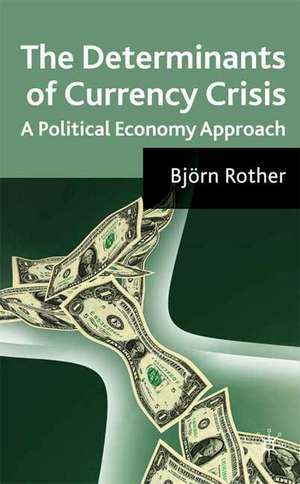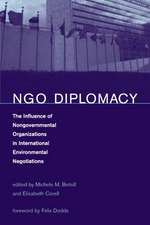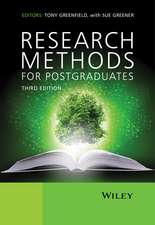The Determinants of Currency Crises: A Political-Economy Approach
Autor B. Rotheren Limba Engleză Hardback – 17 apr 2009
| Toate formatele și edițiile | Preț | Express |
|---|---|---|
| Paperback (1) | 380.45 lei 6-8 săpt. | |
| Palgrave Macmillan UK – 17 apr 2009 | 380.45 lei 6-8 săpt. | |
| Hardback (1) | 386.81 lei 6-8 săpt. | |
| Palgrave Macmillan UK – 17 apr 2009 | 386.81 lei 6-8 săpt. |
Preț: 386.81 lei
Nou
Puncte Express: 580
Preț estimativ în valută:
74.02€ • 80.65$ • 62.37£
74.02€ • 80.65$ • 62.37£
Carte tipărită la comandă
Livrare economică 23 aprilie-07 mai
Preluare comenzi: 021 569.72.76
Specificații
ISBN-13: 9780230221819
ISBN-10: 0230221815
Pagini: 188
Ilustrații: IX, 188 p. 3 illus.
Dimensiuni: 140 x 216 x 18 mm
Greutate: 0.39 kg
Ediția:2009
Editura: Palgrave Macmillan UK
Colecția Palgrave Macmillan
Locul publicării:London, United Kingdom
ISBN-10: 0230221815
Pagini: 188
Ilustrații: IX, 188 p. 3 illus.
Dimensiuni: 140 x 216 x 18 mm
Greutate: 0.39 kg
Ediția:2009
Editura: Palgrave Macmillan UK
Colecția Palgrave Macmillan
Locul publicării:London, United Kingdom
Cuprins
Introduction PART I: SOME CLUES FROM HISTORY Introduction Ending Gold Convertibility in the 1930s Coalition Bickering in Turkey, 2000-01 Meltdown in Argentina, 1991-2002 Emerging Political Patterns PART II: POLITICAL-ECONOMY CRISIS MODELS Introduction A Basic Second-Generation Model The Credibility Problem of Currency Pegs Two Types of Commitment Devices Uncertainty and the Role of Elections A Fiscal Veto Player Currency Crises and Fiscal Policy Decisions The Scope for Intra-Governmental Confict A Stochastic Fiscal Target Lobbying and Exchange Rate Stability PART III: THE ROLE OF POLITICS IN CRISIS PREDICTION Introduction Literature Survey Data Set and Empirical Strategy Country Sample and Crisis Measure The Choice of Regressors Empirical Strategy Key Findings Descriptive Statistics Political-Economy Logit Models Robustness Checks Extensions The Link between Elections and Crises The Link between Left Governments and Crises Conclusion Appendices Deriving the Supply Function Survey of Econometric Studies Data Issues Endnotes Bibliography
Recenzii
This book cuts to the heart of the policy making process by focusing on how political factors affect exchange rate decisions. By grounding insight from economics, economic history and political science in a consistent methodological framework, the author moves beyond the narrow focus of much of current economic research to produce a compelling account of the political economy of exchange rate decision making. (Dr. Domenico Lombardi, President, The Oxford Institute for Economic Policy)
'Currency Crises are an elusive phenomenon. At times, all signs point to a storm, yet nothing happens, and at other times the ocean is flat but a crisis hits out of the blue sky. Rother appears to sympathize with Kindleberger's beautiful 'one knows a financial crisis when it happens' but he is up to more, indeed much more. Convinced that in addition to economic fundamentals politics play a decisive role in the evolution of currency crises he sets out to develop and then to test a political-economy model of a crisis predictor that may serve as an early warning system'. Michael Braulke, Professor of Economics, Universität Osnabrück, Germany.
'Currency Crises are an elusive phenomenon. At times, all signs point to a storm, yet nothing happens, and at other times the ocean is flat but a crisis hits out of the blue sky. Rother appears to sympathize with Kindleberger's beautiful 'one knows a financial crisis when it happens' but he is up to more, indeed much more. Convinced that in addition to economic fundamentals politics play a decisive role in the evolution of currency crises he sets out to develop and then to test a political-economy model of a crisis predictor that may serve as an early warning system'. Michael Braulke, Professor of Economics, Universität Osnabrück, Germany.
Notă biografică
BJÖRN ROTHER is an Economist at the International Monetary Fund in Washington DC, USA and worked previously as a consultant with Mckinsey& Company Inc. He holds a Doctorate in Economics from the Free University of Berlin.













